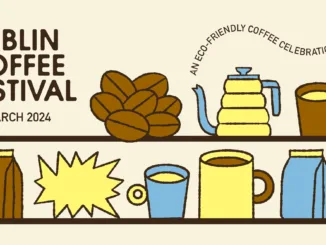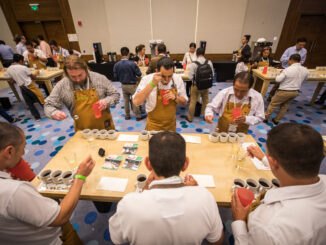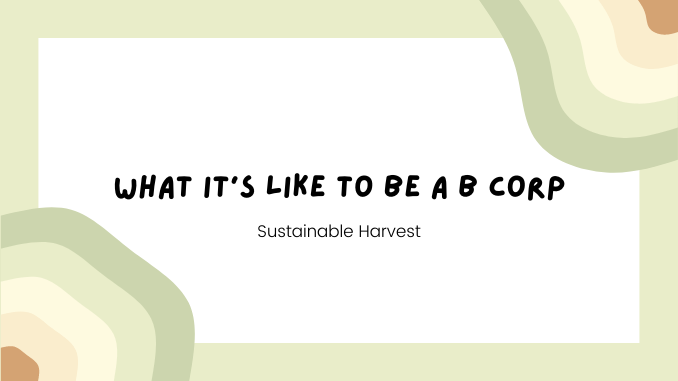
We continue our series on B Corp for businesses that want to do better—this time from the perspective of a coffee importer.
BY YKER VALERIO
SPECIAL TO BARISTA MAGAZINE ONLINE
Photos courtesy of Sustainable Harvest
Transparency and beneficial relationships are at the heart of a more equitable and sustainable coffee supply chain. Historically, commodity trade traditions have sometimes made it difficult to maintain transparency and long-term business relationships, resulting in a considerable income gap between coffee producers, importers, and roasters.
Curiously enough, coffee producers absorb most of the risk in the value chain, yet they profit less than importing and roasting companies. Although specialty coffee has advanced significant changes to promote a more sustainable and fair supply chain, there is still pending work.
This inequality has driven many businesses to establish alternative venues for profit. In this regard, B Corp-certified businesses address major issues, prioritizing benefit over profit. David Griswold, founder of the coffee importing company Sustainable Harvest, saw a unique appeal in the certification because it focuses on positive impact instead of shareholder value. “I was concerned about running a business only to maximize value for shareholders,“ explains David.
In this edition of our B Corp series, we learn about the experience of being a coffee importer with the certification.
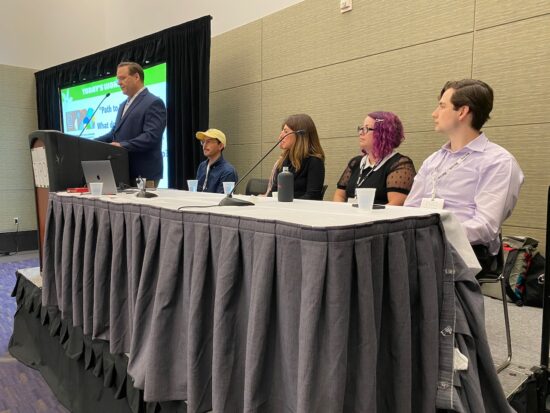
Why Become a B Corp?
Coffee importers connect coffee producers with profitable businesses worldwide—and that’s a significant opportunity to improve the supply chain, both in economic and social terms.
Sustainable Harvest was the first coffee importer to become a B Corp in 2008. Back then, “Our office was in a building with different businesses with a social purpose,“ David says. Through this network and a genuine concern about creating benefits for stakeholders, applying for the certification seemed natural for the company.
“I attended a food conference in Portland and listened to an early seminar given by the B Corp co-founders, but was the only coffee company present,“ explains David about the first time he learned about the organization. Changing Sustainable Harvest’s articles of incorporation to be an organization that puts benefit first was the main appeal. Legally, the company would aim to pursue a positive impact, which was one of its main concerns in the beginning.
Another valuable aspect of B Corp standards, and the movement, is competitiveness and the pursuit of excellence. “We are competing to make more points,“ says David. In doing so, B Corp is “pushing people to higher standards.“
Is It Hard to Become a B Corp?
Perhaps authenticity is one of the most important aspects of applying for the B Corp certification for Sustainable Harvest. Some companies may look for certifications to improve their reputation without taking sustainability and positive impact seriously. Yet, the B Corp certification process doesn’t accommodate superficial change.
“Some companies use other certifications for greenwashing,“ says David, but “the B Corp certification process is a huge endeavor. It’s a big commitment of time.“
According to David, becoming a B Corp “isn’t something you can do in your free time.“ Even after more than 10 years, the recertification process can be tough. “We thought we were doing good, but we have many things to do,“ he claims.
“The certification process is getting harder,“ says David, because “B Corp standards constantly evolve.“ Like solving most current global challenges, creating a positive impact is a moving target.
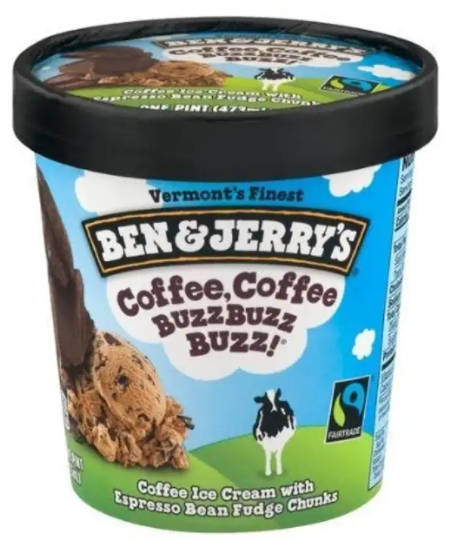
How to Implement B Corp Standards
David recommends that other B Corps promote awareness of B Corp standards and the scoring system across the company. “If your employees don’t know about a policy, it’s like it doesn’t exist,“ says David. In this regard, their standards must be part of the company’s daily activities to become “part of how you make decisions,“ he says.
To learn about the standards and explore how feasible they are for a company, David recommends taking the free online B Impact Assessment. “Most companies only score 50 points on the 200-point scale, but if you get around 80-85, you may want to consider becoming certified,” he says. “B Lab suggests you should aim to submit your assessment with a score of 85+, as it is very common for companies’ scores to drop at least 5-10 points during the actual verification/review process.“
And, when in doubt or facing any challenge, it’s crucial to look for support. “Reach out to B Corps and ask for advice and help,“ says David.
In short, becoming a B Corp means setting challenging goals. But it also means being willing to rely on a support network, and ask for help when you need it.
ABOUT THE AUTHOR
Yker Valerio (he/him) is a freelance content creator. After more than 10 years of working as a management consultant, he started the blog Bon Vivant Caffè to share his passion for specialty coffee.



